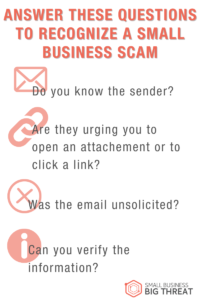We interrupt your regularly scheduled cybersecurity during the holidays blog entry with this special alert on COVID-19 vaccine cyber-scams!
Reported by KnowBe4that there is, “the potential for a surge of phishing attacks that take advantage of COVID-19 vaccine.” Unfortunately, this shouldn’t come as a surprise since it has been very common for cyber-attackers to exploit COVID-19 for their gain. So how can you identify when emails might be a COVID-19 vaccine cyber-scams? Our following tips can help!
Phishing Scams during a Crisis
Last March we published a Security Bytes entry about Phishing Scams during a Crisis.This blog provided an example of a suspicious email and what warning signs to look out for. Although this example was a phishing attack revolving around business, these identifications are useful to determine a COVID-19 vaccine phishing email.
Questions to Answer to Determine if Emails are COVID-19 Vaccine Cyber-Scams (Apply These Tips to all Phishing Emails!)
It is important to try and verify an email’s authenticity whenever one is received. Some useful questions to ask when looking at an email are:
-
“Do I know the sender?” Check the Sender name and the email address.
-
“Are they urging me to open an attachment or to click a link?”
-
“Was I expecting this email or was it unsolicited?”
-
“Can I verify the information in the email?”
While these questions are not 100 percent effective in identifying every phishing email, these questions will help minimize phishing email success. As hundreds of emails potentially hit your inbox every day, it is important to try and ask yourself these questions for each email you interact with.
Security Solutions on Your Side
Sometimes asking the above questions is not enough to protect yourself from falling victim to a phishing email. In these cases it is important to have the right security solutions in place. The solutions can range between having antivirus software installed on your devices, to having up to date data backups in case you fall victim. The may also include having solutions in place that scan incoming emails for malicious links and attachments, or having a security solutions provider who can assist when needed.
To learn more about small business cybersecurity checkout Small Business, Big Threat!
